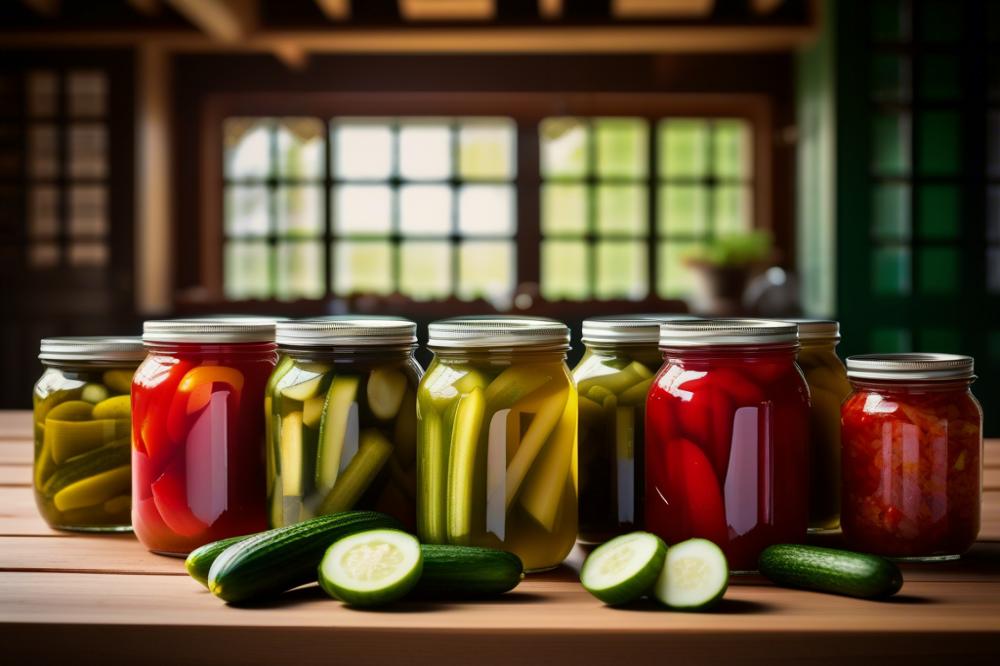Discovering the Flavorful World of Polish pickles and fermented foods
Poland boasts a rich culinary heritage that invites exploration and excitement. At the heart of this culture are pickles and fermented foods, cherished for their bold flavors and nutritional benefits. The artistry of preservation has been practiced for generations, showcasing traditional recipes that connect families and communities.
Fermentation serves as both a method and a craft, transforming ordinary ingredients into extraordinary delights. probiotics found in foods like sauerkraut and kimchi benefit gut health. Sour cucumbers, drenched in zesty brine, tantalize the palate while offering essential nutrients. Each bite tells a story of age-old techniques and the people who perfected them.
As you embark on this culinary adventure, you’ll uncover the diverse varieties of Polish pickles. Each region in Poland has its unique spin on fermentation, influenced by local traditions and ingredients. Similar to how an artist chooses different colors for a canvas, the use of spices and herbs enhances each recipe, making every dish a work of art.
Understanding the health benefits of these fermented delights is essential. They are not only tasty but also vital for a balanced diet. Preserving food while enhancing flavors has been a cornerstone of Polish cuisine. You will find that every element contributes to the overall experience, making this journey through food both satisfying and enlightening.
Join us as we dive deeper into the varieties of Polish pickles, uncovering more about their history, and savor the flavors and methods that make these foods a treasure of Polish culture.
Polish Pickles: A Delicious Introduction

Polish pickles hold a special place in the heart of Polish cuisine. Many dishes are incomplete without them. These flavorful condiments often come in the form of sour cucumbers. They provide a tangy taste that perfectly complements hearty meals.
Brine and fermentation are crucial in creating these beloved foods. The brine, a mixture of salt and water, not only adds flavor but also helps in preserving the vegetables. Fermentation brings probiotics into the mix, which are beneficial for gut health. This process transforms fresh cucumbers into a delicious and tangy masterpiece.
Aside from sour cucumbers, the world of Polish pickles includes sauerkraut. This dish, made from fermented cabbage, is emblematic of the region’s culinary history. Traditionally, methods have been passed down through generations. Families often have their own unique recipes that bring a personal touch to their pickles.
Kimchi, though not Polish, shares similarities with sauerkraut. Both types of food come from fermentation, yet they offer different flavor profiles. While kimchi is spicy and rich, sauerkraut leans on the tangy and sour side. Each brings health benefits and excitement to the table.
Recipes for both pickles and sauerkraut are often simple. Few ingredients are needed to create something truly delightful. Salt, water, and the vegetables themselves make up the core of most traditional recipes. Careful attention to ratios can lead to the perfect crunch and flavor. This knowledge is treasured among many families.
Poland’s culinary culture thrives on such techniques of preserving food. The process connects generations, fostering a sense of community. These pickled delights not only add flavor to meals but also offer insights into the country’s history. Engaging with these foods is like taking a bite out of Poland’s past, celebrated through every tangy morsel.
Health Benefits of Fermented Foods

Fermented foods are more than just tasty additions to meals. They offer immense health benefits, particularly for our digestive systems. Many people enjoy foods like sauerkraut because they are rich in probiotics. These beneficial bacteria help maintain a balanced gut microbiome, which is essential for overall well-being.
Let’s take a closer look at sauerkraut. This fermented cabbage dish is a staple in Polish cuisine and has been enjoyed for centuries. The fermentation process involves using brine, allowing the cabbage to develop its unique sour flavor. As it ferments, beneficial bacteria thrive, turning this simple vegetable into a powerhouse of nutrients.
Kimchi, another popular fermented food, shares similar benefits. Made from seasoned vegetables, this traditional recipe is known for its spicy flavor and exceptional taste. Like sauerkraut, kimchi is rich in probiotics, which aid digestion and help the body absorb nutrients more efficiently.
Sour cucumbers are another favorite. These pickled delights are commonly found in many dishes. The fermentation process used to create them not only preserves the cucumbers but also adds a delightful tang. Rich in vitamins and healthy bacteria, sour cucumbers can enhance your meal and improve gut health.
Preserving vegetables through fermentation has been a practice for generations. This method not only extends the shelf life of foods but also transforms them into nutritious options. People often overlook the health benefits that come with fermented foods. By adding them to your diet, you may experience improved digestion, increased energy levels, and even enhanced immunity.
Incorporating these foods into your meals is a tasty way to embrace their health benefits. Enjoying Polish pickles, sauerkraut, or kimchi can easily become a delightful part of your daily routine. The gut health promotion and overall wellness linked to these fermented delights make them worth considering for anyone looking to improve their diet.
Traditional Fermentation Techniques

Preserving food is deeply rooted in Polish culture. Methods such as lacto-fermentation and traditional brining techniques have been used for generations. These practices not only keep food safe but also enhance flavors and nutritional value.
Lacto-fermentation is a fascinating process. This technique involves using beneficial bacteria to convert sugars into lactic acid. The result is a tangy taste and a probiotic-rich product. Sauerkraut is one of the most famous examples of this method. Made from fermented cabbage, it provides health benefits that can support digestion and boost gut health.
Interestingly, sour cucumbers are also a staple in Polish households. They are preserved in a salty brine, developing their own unique flavor profile over time. Families often pass down traditional recipes that highlight these techniques. Such recipes create a link between generations and foster a sense of community.
Brining is another essential method. The simple combination of water, salt, and spices creates an environment ideal for fermentation. This process produces a variety of pickled vegetables, enhancing the diversity of Polish cuisine. Whether it’s beets, carrots, or other seasonal ingredients, brined foods offer a taste of history.
The influence of these fermentation methods reaches into modern cooking as well. Chefs and home cooks alike recognize the health advantages of incorporating fermented foods. Today, many people are looking for ways to add probiotics to their diets. Fermented foods can easily be added to meals, making them more nourishing.
These traditional practices have shaped not only Polish cooking but also global culinary trends. As the world becomes more health-conscious, the appreciation for fermented foods grows. People are eager to explore diverse flavors and cultures through the lens of pickles and other fermented goodies.
Culinary Tour Experiences: What to Expect

A culinary adventure holiday in Poland offers a delightful experience for food enthusiasts. Expect to dive into the world of pickles and fermented foods. Various tours provide opportunities to taste brine-soaked treats like sour cucumbers. Tours often center around hands-on workshops, where participants can learn to make traditional sauerkraut and kimchi.
Skillful chefs lead these workshops. They share their expertise in fermentation techniques and traditional recipes. Attendees gain practical knowledge that they can take home. Making fermented foods is not just about the techniques; it’s about the health benefits that come with consuming probiotics.
Local markets are another highlight of these culinary adventures. Visitors stroll through stalls brimming with artisanal products. Vendors proudly present their homemade goods, showcasing unique flavors and techniques. The vibrant atmosphere excites your senses. You can taste samples and chat with the friendly locals who explain their craft.
Expect to experience more than just food. This journey immerses travelers in Polish culture. History intertwines with each dish and ingredient. Sampling these foods offers insights into generations of preserving methods.
Throughout the tour, you’ll discover how fermentation has shaped Polish cuisine. Many recipes have been passed down for years. Fermented foods are staples here, treasured for their taste and health advantages. From the zesty crunch of pickles to the tangy notes of fermented cabbage, every bite tells a story.
Participants often leave with a deeper appreciation for food and culture. The knowledge gained during these trips usually inspires culinary creativity. Friends and family enjoy trying out new recipes learned during the experience. With each dish prepared, the flavors of Poland come to life in your own kitchen.
Exploring Regional Varieties and Specialties
Poland boasts a rich tapestry of fermented foods, with each region adding its own flavor and flair. For example, the south is famous for its hearty forms of sauerkraut. Locals often enhance traditional recipes with spices and herbs that reflect their mountainous terrain. It’s fascinating to see how the geography shapes not just the ingredients but also the methods of fermentation.
In the north, you’ll find a variety of brine-pickled sour cucumbers. These are often served as a crunchy side dish or snack, celebrating the coastal influence. The freshness of the cucumbers changes how the fermentation process works, leading to delightful textures and tastes. Every bite tells a story of local farming practices and food preservation methods that have been passed down through generations.
In addition to sour cucumbers, various towns take pride in their versions of kimchi. While traditionally associated with Korean cuisine, Polish adaptations incorporate local vegetables and spices. This fusion creates a beautiful blend of flavors that surprises many travelers. Experimenting with these regional specialties allows visitors to experience the diverse influence of Polish cuisine firsthand.
Health benefits abound when indulging in fermented foods. Each serving not only offers probiotic goodness, but also helps enhance digestion. Many locals swear by these traditional delights for maintaining well-being. As you travel through Poland, look for markets and street vendors selling their homemade treats. This will give you a chance to sample authentic flavors that you won’t find anywhere else.
So, pack your bags and get ready to embark on a culinary adventure. Don’t just stick to popular tourist spots. Venture into smaller towns and village festivals where you can discover hidden gems of fermentation. Stay curious and open, and let the regional specialties guide your taste buds on a journey you won’t forget.
Final Thoughts on Polish Pickles and Fermented Foods
Polish pickles and fermented foods play a vital role in the culinary scene. They are not just delicious; they are steeped in tradition and history. Many families have cherished recipes passed down through generations. Fermented foods, including sauerkraut, offer remarkable health benefits. Such foods are packed with probiotics, which are beneficial for gut health and digestion. This makes them an integral part of a balanced diet.
Exploring this vibrant food culture will deepen your appreciation for Poland’s rich culinary heritage. The taste of these fermented delights is truly unmatched. Each bite transports you to bustling markets and lively kitchens, where the air is filled with the smell of spices and pickling brine. Discovering local varieties can also spark your creativity in the kitchen, inspiring you to experiment with flavors and dishes in your own cooking.
A culinary tour of these foods encourages a connection to the land and its people. Embrace the chance to learn more about regional differences and the stories behind these cherished recipes. Whether enjoyed at home or while traveling, the experience of tasting and cooking with these unique ingredients can bring not just pleasure, but also health to your life.
In closing, consider setting off on your own journey to discover what Polish pickles and fermented foods have to offer. You will find a world of vibrant flavors, healthful benefits, and cultural significance waiting for you. Dive in and enjoy this flavorful adventure!



